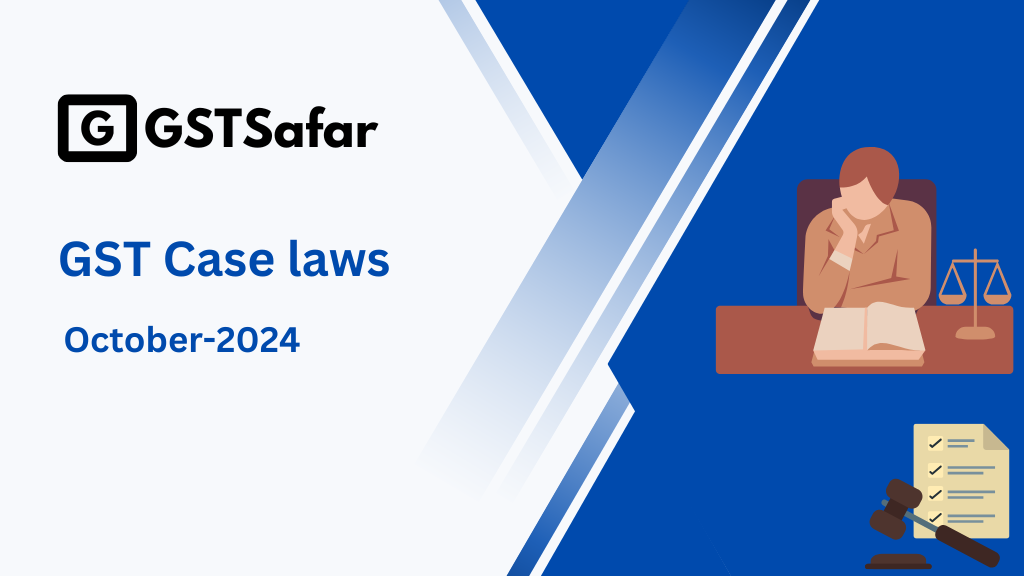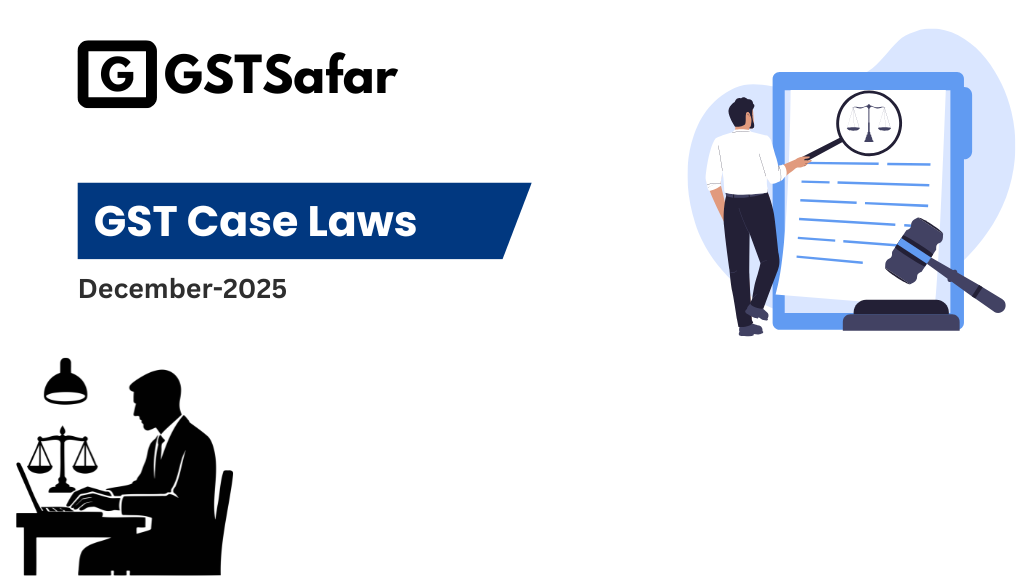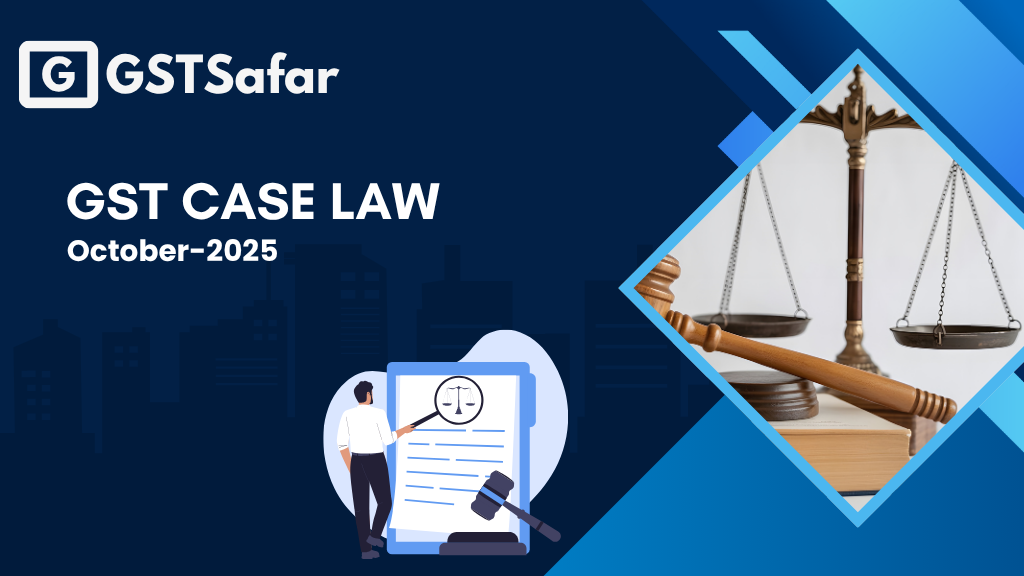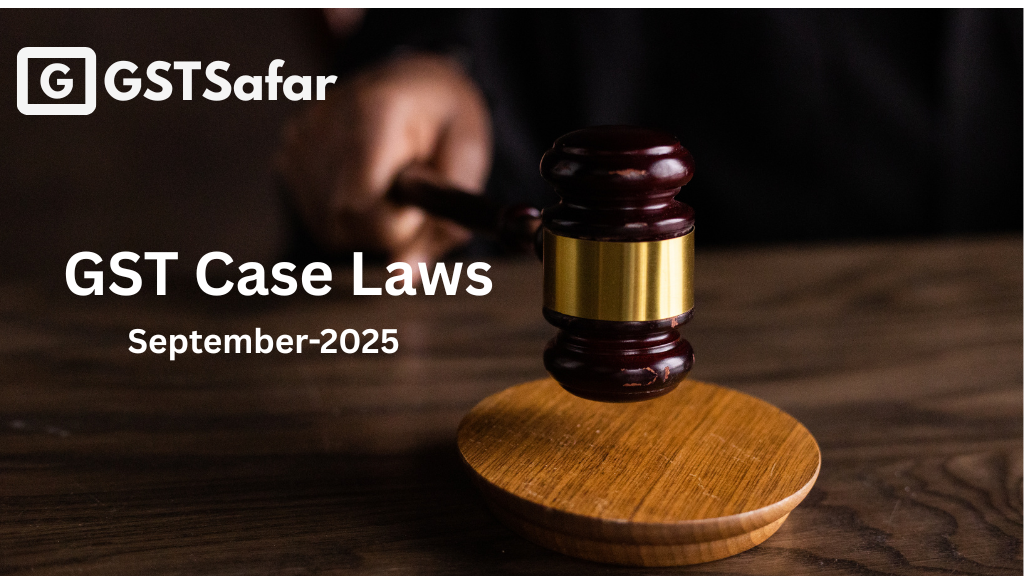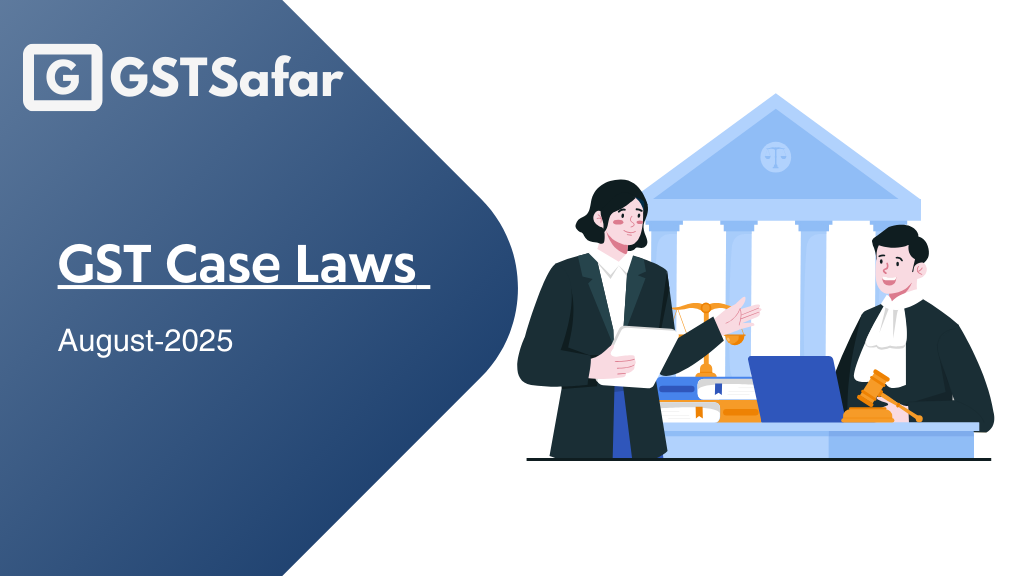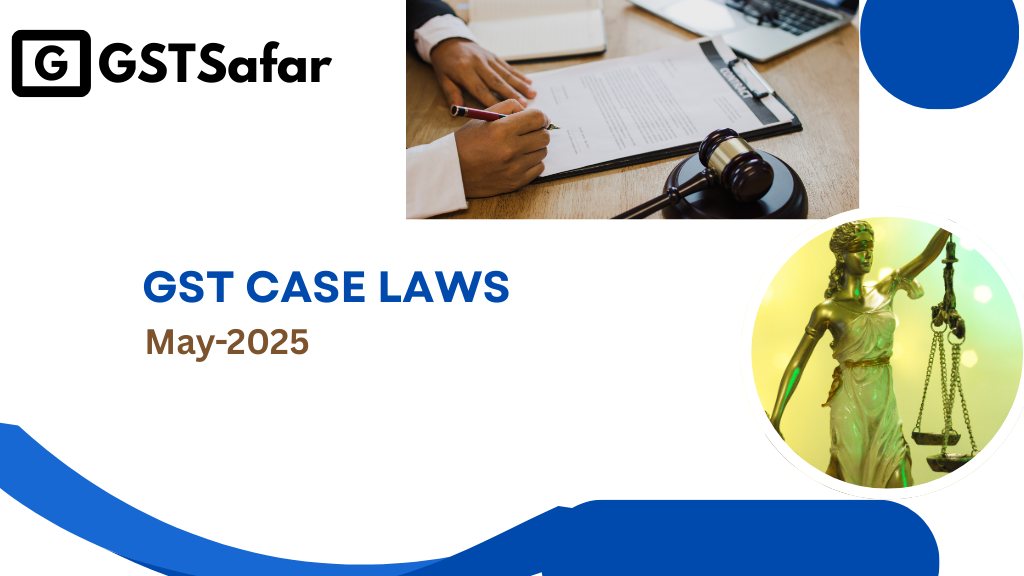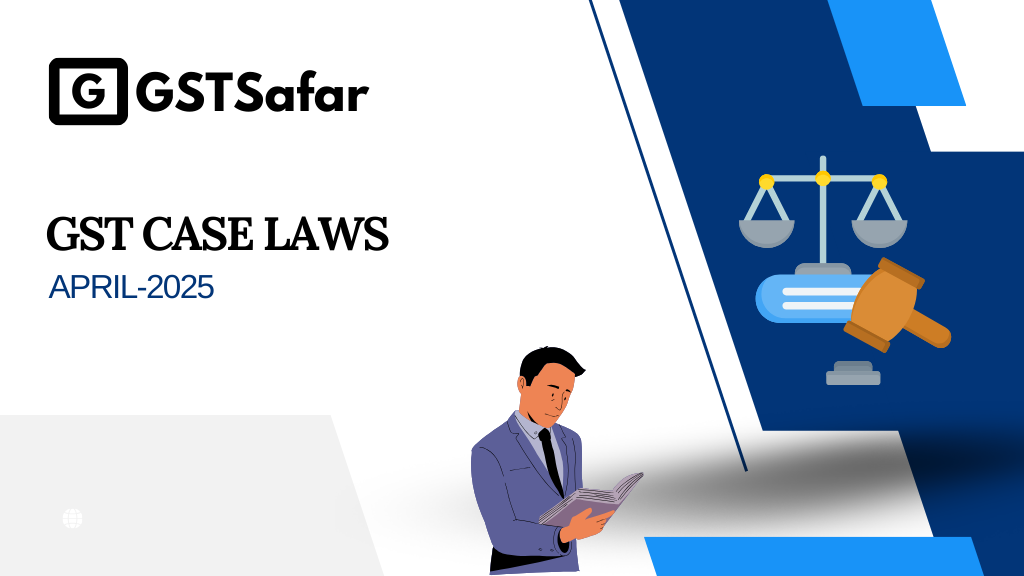The goal of this article is to cover all recent GST case laws October 2024. All latest high court judgement on gst and all latest supreme court judgments on gst issued in October 2024 have been covered in this article. All latest GST case laws of October 2024 in this article have been classified by name, date, judge, counsel, GST concept, GST section, etc. In addition, a PDF of the GST case law is provided with the case law so that the user can download it for further study.
Table of Contents
ToggleGST Case law on Dispute Over Double Proceedings on TRAN-1 Credit | GST Case Laws October 2024
Calcutta High Court says the writ petition needs to be heard again to resolve these important questions.
| Calcutta High Court Judgement 2024 |
| Name of case : Agarwal Steel (P.) LTD. vs. Superintendent of Central Tax |
| Date of Judgment : 01-10-2024 |
| Appeal No : MAT 1697 of 2024 IA No. CAN 1 and 2 of 2024 |
| Judges : T. S. SIVAGNANAM, CJ. and BIVAS PATTANAYAK, J. |
| Counsel Name : Sandip Choraria, Sukalpa Seal and Rishav Manna |
| Fact of the Case: The petitioner claimed TRAN-1 credit of ₹1,01,16,814, but the tax department allowed only ₹99,19,582, with the petitioner voluntarily reversing the difference of ₹1,97,232 and submitting Form GST DRC-01 as compliance. Later, another officer issued a fresh notice to recover the full amount of ₹1,01,16,814, along with interest and penalty, despite the matter being previously settled. The petitioner argued that fresh proceedings on the same issue were unjustified, but the adjudicating authority ignored this and passed an adverse order, citing insufficient documentation. The petitioner challenged this through a writ petition, which the court dismissed, stating that the proper course of action was to appeal through the appropriate forum. |
| Held by court : The main issue was whether the second order was passed without properly considering the relevant facts and documents, or if it showed a lack of proper judgment. These concerns should have been addressed in the writ petition. However, the writ court dismissed the petition only because the petitioner had the option to file an appeal through the usual process. The court should have examined the impact of the earlier order and whether new proceedings could be started on the same facts. Therefore, the writ petition needs to be heard again to resolve these important questions. |
| In favor of : Assessee |
| Topic of GST : Demand |
| Section of GST: Section 74 of CGST Act,2017 |
Download Calcutta High Court Judgement of Agarwal Steel (P.) LTD.
GST Case law on Input Tax Credit on construction of Immovable property| GST Case Laws October 2024
Supreme Court say Each case will be evaluated based on its specific facts and circumstances to determine whether the property qualifies as a “plant” under the meaning of clause (d) of Section 17(5).
| Supreme Court Judgement 2024 |
| Name of case : Chief Commissioner of Central Goods and Service Tax vs. Safari Retreats (P.) Ltd. |
| Date of Judgment : 03-10-2024 |
| Appeal No : WRIT PETITION (CIVIL) NOS. 804 of 2022 & 1030 of 2022 and others CIVIL APPEAL NO. 2948 OF 2023 |
| Judges : ABHAY S. OKA and SANJAY KAROL, JJ. |
| Counsel Name : |
| Fact of the Case: The right to claim Input Tax Credit (ITC) is not automatic; it is governed by the law. The legislature has the authority to specify when ITC can or cannot be claimed by creating exceptions in the statute. As per the GST law, clauses (c) and (d) of Section 17(5) deal with specific cases where ITC is blocked. These clauses are valid and apply particularly to immovable property or immovable goods, which are treated as a separate category under GST.There is no ambiguity in the language of these clauses, so there is no need to interpret or “read down” the provisions to limit their application. However, a key question arises regarding whether certain buildings, like a mall or warehouse, could be considered as “plant” or “machinery” under Section 17(5)(d) to allow ITC. The answer depends on the purpose and role of the building in the business |
| Held by court : If the construction of the building is essential for providing services (for example, a factory building that is critical to manufacturing), the building could qualify as a “plant.” In such cases, the building would fall outside the blocked credit restrictions mentioned in clause (d) of Section 17(5). To determine whether a building qualifies as “plant,” a functionality test must be applied, evaluating how the building contributes to the registered person’s business operations on a case-by-case basis. |
| In favor of : Partly in Favor of Assessee |
| Topic of GST : Input Tax Credit |
| Section of GST: Section 17 of CGST Act,2017 |
Download Supreme Court Judgement of Safari Retreats Pvt Limited
GST Case law on Dispute Over Limitation Period for Filing an Appeal| GST Case Laws October 2024
Allahabad High Court says when the limitation period starts, the matter needs further examination to ensure a fair decision.
| Allahabad High Court Judgement 2024 |
| Name of case : V.P. Enterprises vs. Commissioner Of State Taxes |
| Date of Judgment : 03-10-2024 |
| Appeal No : WRIT TAX No. – 1643 of 2024 |
| Judges : Piyush Agrawal, J. |
| Counsel Name : Praveen Kumar |
| Fact of the Case: The appellate authority dismissed the assessee’s appeal as time-barred, calculating the limitation period from the order date (30-08-2023). The assessee argued that the order was not directly communicated and merely uploading it on the GST portal under Section 169 does not count as proper communication. The assessee claimed they only became aware of the order on 22-04-2024, and since they filed the appeal on 15-06-2024, it was within the limitation period. Despite this, the appellate authority dismissed the appeal without properly considering the actual date of communication, which the assessee argues was arbitrary and unfair. |
| Held by court : The respondent authority must provide a counter affidavit (a formal written response) to explain their position. This will allow the court to properly understand the facts and decide if the dismissal of the appeal on grounds of limitation was justified. |
| In favor of : Matter listed |
| Topic of GST : Appeal to appellate authority |
| Section of GST: Section 107 read with section 169 of CGST Act,2017 |
Download Allahabad High Court Judgement of V.P. Enterprises
GST Case laws on Relief Granted for Input Tax Credit Denial Due to Inadvertent Mistake
Kerala High Court says the taxpayer was allowed some relief.
| Kerala High Court Judgement 2024 |
| Name of case : Ancheril Agencies vs. Deputy Commissioner |
| Date of Judgment : 22-10-2024 |
| Appeal No : WP(C) NO. 43416 of 2023 |
| Judges : Gopinath P., J. |
| Counsel Name : Joseph Jerard Samson Rodrigues |
| Fact of the Case: An assessee (a taxpayer) made a mistake in their tax filing for the year 2017-18. When filling out their annual return, they accidentally marked the “place of supply” as an “other territory” rather than “Kerala.”Due to this mistake, the tax that should have gone to the state of Kerala was not allocated correctly. As a result, Kerala did not receive the tax it was due, leading to a denial of input tax credit for the taxpayer. Essentially, because the taxpayer’s error caused a misallocation of tax, they were unable to claim credit for that portion of tax. |
| Held by court : Because the mistake happened right after GST was introduced—a time when taxpayers were still adjusting to the new system—the taxpayer (assessee) was allowed some relief. The original order denying the input tax credit and any related recovery notices were to be canceled. The authorities were directed to let the taxpayer correct their annual return for 2017-18, fixing the place of supply error. After resubmission, the authorities would review and process the corrected return according to the rules. |
| In favor of : Assessee |
| Topic of GST : Availment of Input Tax Credit |
| Section of GST: Section 41 of CGST Act,2017 |
Download Kerala High Court Judgement of Ancheril Agencies
GST Case law on Appellate Authority’s Duty to Decide Appeals
Patna High Court says the appeal was to be reopened for a full and fair review.
| Patna High Court Judgement 2024 |
| Name of case : Silverline vs. State of Bihar |
| Date of Judgment : 21-10-2024 |
| Appeal No : Civil Writ Jurisdiction Case No.14454 of 2024 |
| Judges : K. Vinod Chandran, CJ. and Partha Sarthy, J. |
| Counsel Name : Anubhav Khowala, |
| Fact of the Case: The appellate authority (the body that reviews appeals) dismissed the appellant’s (the person making the appeal) case because they did not provide the necessary documents to support their claim, even though they were given a chance to do so. Essentially, the appeal was denied because the appellant did not submit the required evidence despite being given an opportunity. |
| Held by court : The appellate authority (the appeals review body) has a legal duty to thoroughly review and evaluate the actual issues and arguments raised by the appellant, even if the appeal is being considered without the appellant present (ex parte). This means they must look at the main points raised in the appeal and decide based on the facts and merits of the case. If they fail to do this, they are not fulfilling their role properly. In this situation, the previous decision was canceled, and the appeal was to be reopened for a full and fair review. |
| In favor of : Assessee |
| Topic of GST : Appeal to appellate authority |
| Section of GST: Section 107 of CGST Act,2017 |
Download Patna High Court Judgement of Silverline
GST Case law on Petition Rejected with Penalty for Inadequate Details in Show Cause Notice
Bombay High Court ordered to pay a penalty (cost) of Rs. 5 lakhs for bringing a baseless case.
| Bombay High Court Judgement 2024 |
| Name of case : Viswaat Chemicals Ltd. vs. Union of india |
| Date of Judgment : 14-10-2024 |
| Appeal No : WRIT PETITION (L) NO. 27725 OF 2024 |
| Judges : M.S. Sonak and Jitendra Jain, JJ. |
| Counsel Name : Vishal Agrawal, Abhishek Deodhar, and Rishabh Jain |
| Fact of the Case: A taxpayer (assessee) received a show cause notice (a formal notice asking them to explain why certain tax actions were taken) and then an order was issued based on this notice. The taxpayer challenged this order in court, arguing that the notice was unclear and lacked important details. Because of this, the taxpayer couldn’t properly respond to the notice, which they claimed violated their right to a fair hearing (principles of natural justice). They also argued that the authority who issued the notice didn’t have the right to do so, making the order invalid. |
| Held by court : After reviewing the show cause notice, it was found to be clear and included all necessary details. The taxpayer’s claim that the notice was unclear was unfounded and based on a misunderstanding. Because of this, the taxpayer’s petition was rejected, and they were ordered to pay a penalty (cost) of Rs. 5 lakhs for bringing a baseless case. |
| In favor of : Revenue |
| Topic of GST : Demands |
| Section of GST: Section 73 of CGST Act,2017 |
